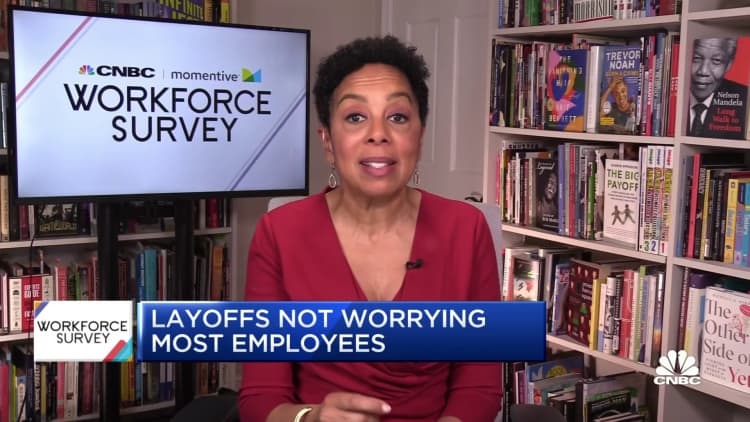Gaming out the likelihood, timing, and intensity of an impending recession is already shaping up to be the big question facing business leaders in 2023, just as it was all throughout this year.
New data from the CNBC|Momentive Workforce Survey provide one early signal for what is to come, pointing to a direct tie between business performance and employee engagement. Employees who express the highest morale among their colleagues also report the greatest confidence that their company can weather a recession.
The survey, fielded among more than 10,000 workers in the U.S. from November 28 to December 5, finds that overall employee morale has reached a new all-time high, with 72% of workers describing morale as either excellent or good.
These data have very little variation by gender, age, race, industry, firm size, or any of the other characteristics we typically examine. In fact, there is no demographic or firmographic group in which the number of workers describing morale as negative outnumbers those who describe it as positive.
In more good news from the survey, most workers (74%) say their company is prepared to withstand a recession if one were to occur. Across workers of all job levels, incomes, and industries, anywhere from two-thirds to 8 in 10 express confidence in their company's ability to survive a downturn.
The link between employee satisfaction and business success
As it turns out, employees' perceptions of morale are strongly correlated with their confidence that their company could make it through a recession — more so than any demographic or firmographic characteristic. Among workers who describe morale at their company as "excellent," 86% say their company is prepared to handle a recession. Among those who describe morale as "poor," that number falls to just 42%.
Workers are often the first to know when a company is starting to slip into mediocrity: they have access to internal data, they know which star colleagues are leaving for better jobs, and they pick up on subtle changes in communication from management. It's only logical that companies where morale is high are the likeliest to have the confidence of their employees, and that the opposite holds true as well.
Those who are looking to quit are also, unsurprisingly, more pessimistic about their company's chances of making it through a recession. They might want to depart exactly because of that lack of confidence, thinking it's better to jump from a sinking ship than to drown.
Overall, 36% of workers say they've seriously considered quitting their job in the last three months, down slightly from the all-time high seen in May (39%), but still higher than any previous iteration of our Workforce Survey.

This is the season when companies are looking ahead, making strategic plans and setting ambitious goals for everything they hope to accomplish in the next year — and how they will track and measure their success. All companies prioritize their financials, but not everyone gives as much thought to measuring morale.
If so, that's a huge chunk of data they're failing to capture. For business leaders to really be confident in their ability to weather a recession, they have to have an ear to the ground and really understand the sentiment among their employees.
Steps businesses can take to boost employee morale
Based on this latest data, we know that high morale is correlated with high confidence in a business's success.
Since April 2019, CNBC and Momentive have checked in with workers across the U.S. every few months to track five key factors that directly contribute to employee morale: workers' satisfaction with their pay, their opportunities to advance their careers, the recognition they get from their colleagues, the amount of autonomy they have each day, and the degree to which they find meaning in their work.
All five are highly correlated with overall job satisfaction, but business leaders looking to quickly boost employee morale might want to home in on autonomy. Creating more space for workers to decide when and how they do their jobs is a lever that executives can pull to have an immediate effect on employee morale. Workers who do their job fully or mostly from home report slightly higher measures of autonomy, and correspondingly higher rates of confidence that their company can handle a recession.
However they choose to address morale, the first step is to track employee engagement overall. CNBC and Momentive have nine waves of data from our Workforce Survey to help establish which characteristics are most closely associated with high morale. Without understanding that baseline, business leaders are missing a key piece of the puzzle.
To join the CNBC Workforce Executive Council, apply at cnbccouncils.com/wec.






